Additional Information
Book Details
Abstract
In June 1944, after two wars with the Soviet Union, the Finnish region of Karelia was ceded to the Soviet Union. As a result, the Finnish population of Karelia, nearly 11% of the Finnish population, was moved across the new border. The war years, the loss of territory, the resettlement of the Karelian population, and the reparations that had to be paid to the Allied Forces, were experiences shared by most people living in Finland between 1939 and the late 1950s. Using a family's memoirs, the author shows how these traumatic events affected people in all spheres of their lives and also how they coped physically and emotionally.
Karen Armstrong† was a Professor of Social Anthropology at Helsinki University.
Table of Contents
| Section Title | Page | Action | Price |
|---|---|---|---|
| Remembering Karelia | iii | ||
| Copyright Page | iv | ||
| Contents | v | ||
| List of Illustrations | vii | ||
| Acknowledgements | viii | ||
| A Note on Sources | ix | ||
| Chapter 1. Event and Meaning | 1 | ||
| Chapter 2. Subjective Meaning | 19 | ||
| Chapter 3. Significant Worlds | 32 | ||
| Chapter 4. Genealogical Narratives | 47 | ||
| Chapter 5. Kinship and Nation | 62 | ||
| Chapter 6. Wartime: A National Event | 76 | ||
| Chapter 7. Mamma Hyvä: Meaning and Value in Letters | 97 | ||
| Chapter 8. Towards Mythology | 115 | ||
| Chapter 9. Conclusion: National Political Culture | 133 | ||
| Notes | 137 | ||
| References | 151 | ||
| Index | 157 |
